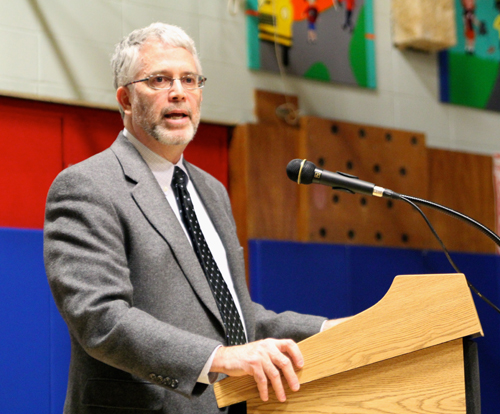SWR proceeds with Princeton Plan for elementary schools

Shoreham-Wading River School District’s elementary students will be divided among buildings based on grade level — not neighborhoods — starting in the 2014-15 school year.
The school board voted 4-2 in favor of implementing what’s called a Princeton Plan — developed in Princeton, N.J., and currently used in other districts — to enhance educational opportunities by grouping elementary school teachers and students by grade in the same buildings while downsizing staffing levels.
Superintendent Steven Cohen said a Princeton Plan model will benefit students because teachers will be with all their grade-level colleagues, which he said will result in an increased opportunity to collaborate on lesson plans.
But which grades will be housed in each building isn’t yet known.
Under one proposal for implementing the Princeton Plan, Briarcliff Elementary School would become a kindergarten-only building. That school currently runs a K-1 program. Students in grades 1-3 would attend either Miller Avenue or Wading River elementary; those in grades 4 and 5 would go to the other.
“The most important benefit from the Princeton Plan is that there’s much more dynamic interaction among teachers in order to improve and distribute high-level instruction and continuity of curriculum,” Mr. Cohen said. “In these days of heightened demands from Common Core and state ed, that is an important consideration to keep in mind as we talk about elementary school.”
The second Princeton Plan option, which would only be implemented if the budget fails in May, would involve closing the Briarcliff school.
During his presentation Tuesday, Mr. Cohen said his office has also drafted a Neighborhood Plan, an option that groups students by “catchment areas,” or where they live. Mr. Cohen wanted to present it for the board’s consideration because residents have said they’d prefer a more traditional option, but the board opted to go with a Princeton Plan.
School board member Robert Rose, who, with Sean Beran, cast a dissenting vote against the Princeton Plan, said that although he liked the Princeton Plan, he believed it would be more appropriate at this time to implement the Neighborhood Plan, which he described as “a baby step” toward the large-scale reconfiguration of the elementary program.
After a nearly two-hour discussion, and with more residents speaking in favor of the Princeton Plan than against it, the board approved the Princeton Plan proposal, with school board vice president John Zukowski and members Richard Pluschau, Michael Fucito, and Jack Costas voting for it. School board president Bill McGrath was absent from the meeting.
Now that the board has agreed to move forward with a Princeton Plan model, Mr. Cohen said it must now look at ways to reduce expenditures in the district’s secondary program.
He said that should the district do nothing, it would face a $8 million budget deficit next year.
The deficit was caused in part by the district’s pulling from its reserves in recent years to maintain programs and staffing levels at the school. Last year, the district used $5.5 million in reserves and leftover balances from the previous year.
Were this year’s budget to roll over into 2014-15 as-is, the district would be looking at a $2.5 million increase in expenditures.








